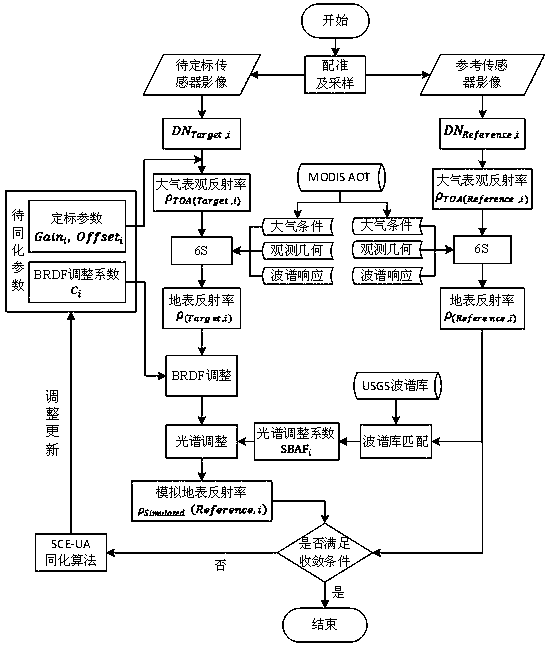Cross-radiation calibration method and system for large observation angle sensors
A radiation calibration and sensor technology, applied in the field of cross-radiation calibration, can solve problems such as the inability to obtain radiation calibration coefficients
- Summary
- Abstract
- Description
- Claims
- Application Information
AI Technical Summary
Problems solved by technology
Method used
Image
Examples
Embodiment Construction
[0057] The technical solutions of the present invention will be described in detail below in conjunction with the accompanying drawings and embodiments.
[0058] The traditional method for ordinary sensors does not need to perform atmospheric correction and BRDF correction. For large observation angle sensors, the influence of atmosphere and BRDF must be solved (because the two are significantly related to the observation angle), so the present invention proposes 6S model atmospheric correction and BRDF for large observation angle sensors. BRDF adjustment factor.
[0059] An embodiment of the present invention provides a data assimilation-based cross-radiation calibration method for sensors with large observation angles. The process is as follows: figure 1 As shown, it specifically includes the following steps:
[0060] (1) Register the image to be calibrated and the reference image, and randomly sample each group of corresponding bands of the image to be calibrated and the r...
PUM
 Login to View More
Login to View More Abstract
Description
Claims
Application Information
 Login to View More
Login to View More - R&D
- Intellectual Property
- Life Sciences
- Materials
- Tech Scout
- Unparalleled Data Quality
- Higher Quality Content
- 60% Fewer Hallucinations
Browse by: Latest US Patents, China's latest patents, Technical Efficacy Thesaurus, Application Domain, Technology Topic, Popular Technical Reports.
© 2025 PatSnap. All rights reserved.Legal|Privacy policy|Modern Slavery Act Transparency Statement|Sitemap|About US| Contact US: help@patsnap.com



